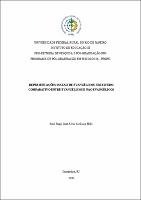Please use this identifier to cite or link to this item:
https://rima.ufrrj.br/jspui/handle/20.500.14407/14479| Tipo do documento: | Dissertação |
| Title: | Representações sociais de evangélicos: um estudo comparativo entre evangélicos e não-evangélicos |
| Authors: | Miki, Abel Jorge Luiz Alves da Graça |
| Orientador(a): | Naiff, Denis Giovani Monteiro |
| Primeiro membro da banca: | Naiff, Denis Giovani Monteiro |
| Segundo membro da banca: | Naiff, Luciene Alves Miguez |
| Terceiro membro da banca: | Wolter, Rafael Moura Coelho Pecly |
| Keywords: | Representações Sociais;Minorias Ativas;Evangélicos;Não evangélicos;Universidade;Social Representations;Active minorities;Evangelicals;Non-Evangelical;University |
| Área(s) do CNPq: | Psicologia |
| Idioma: | por |
| Issue Date: | 10-Dec-2020 |
| Publisher: | Universidade Federal Rural do Rio de Janeiro |
| Sigla da instituição: | UFRRJ |
| Departamento: | Instituto de Educação Pró-Reitoria de Pesquisa e Pós-Graduação |
| Programa: | Programa de Pós-Graduação em Psicologia |
| Citation: | MIKI, Abel Jorge Luiz Alves da Graça. Representações sociais de evangélicos: um estudo comparativo entre evangélicos e não-evangélicos. 2020. 90 f. Dissertação (Mestrado em Psicologia) - Instituto de Educação/Pró-Reitoria de Pesquisa e Pós-Graduação, Universidade Federal Rural do Rio de Janeiro, Seropédica, 2020. |
| Abstract: | O presente trabalho teve o objetivo de identificar e analisar as Representações Sociais construídas em dois grupos: evangélicos e não evangélicos, executando a tarefa de evocação livre - TEL, usando o termo indutor "evangélico". Defrontando as respectivas representações nesses grupos, sendo possível observar as certas causas dos conflitos e desconfortos psicossociais existentes nos dois grupos. A pesquisa contou com 120 participantes, da cidade de Volta Redonda-RJ, ambos sexos, com a faixa etária entre 18 e 69. Os grupos foram divididos em 60 participantes evangélicos e 60 participantes não evangélicos. Para a identificação dos conceitos e fundamentação dos argumentos, admitiu-se como referenciais teóricos, as Representações Sociais e a Psicologia das Minorias Ativas. A primeira teoria contribui para identificar o posicionamento dos grupos evangélicos e não evangélicos, acerca do tema “evangélico”. A segunda teoria contribui para a observação da presença de evangélico na universidade, sob a perspectiva das premissas da teoria das minorias ativas, para identificar os fenômenos psicossociais gerado pelo encontro de dois universos socioculturais, a universidade e os evangélicos. A universidade tornou-se, em nosso século, espaço de vanguarda do conhecimento independente e libertário, principalmente dentro das ciências humanas, onde são defendidas pautas não poucas conservadoras, ou seja, espaço de ideias pluralistas e democráticos. Evangélicos na universidade é uma reflexão de um possível encontro desses dois mundos de representações, onde ambos não apresentam uma predisposição em proporcionar uma convenção ou ações de diálogos. Os desconfortos psicossociais gerados entre os dois grupos, os quais podem fazer irromper atitudes de discriminação e preconceito um pelo outro em um mesmo ambiente. Conclui-se que, tratar essa realidade dos evangélicos na universidade sob o ponto de vista de minorias ativas, levando em conta as Representações Sociais dos não evangélicos sobre o tema, além de ser bastante relevante para a Psicologia Social, tem uma carência maior de atenção, principalmente por se tratar de conflitos, comunicação e influência. |
| Abstract: | The present work aims to identify and analyze the social representations constructed in two groups: evangelical and non-evangelical, performing the Free Recall Task - FRT, using the inductive term "evangelical". Facing the respective representations of the two groups, it will be possible to observe the possible causes of conflicts and psychosocial discomforts in both groups. The survey will include 120 participants, from Volta Redonda-RJ, both genders, aged between 18 and 69. The groups will be divided into 60 evangelical participants and 60 non-evangelical participants. For the identification of the concepts and the foundation of the arguments, the research accepted the social representations and the psychology of active minorities as theoretical references. The first theory helps to identify the position of evangelical and non-evangelical groups on the “evangelical” theme. The second theory contributes to the observation of the evangelical presence in the university, from the perspective of the premises of the active minorities theory, to identify the psychosocial phenomena generated by the encounter of two sociocultural universes, the university and the evangelicals. The university has become, in our century, the vanguard of independent and libertarian knowledge, mainly within the human sciences, where there are many conservative guidelines, that is, a space for pluralist and democratic ideas. The evangelicals at the university is a reflection of a possible encounter between these two worlds of representations, where both do not have a predisposition to provide a convention or dialog actions. The psychosocial discomforts generated between the two groups, which can cause attitudes of discrimination and prejudice to erupt in the same environment. It is concluded that treating this reality of evangelicals in the university from the active minorities point of view, taking into account the social representations of non-evangelicals on the same theme, is an investigation, in addition to being quite relevant for social psychology, it has a greater need for attention, mainly because it is about conflicts, communication and influence. |
| URI: | https://rima.ufrrj.br/jspui/handle/20.500.14407/14479 |
| Appears in Collections: | Mestrado em Psicologia |
Se for cadastrado no RIMA, poderá receber informações por email.
Se ainda não tem uma conta, cadastre-se aqui!
Files in This Item:
| File | Description | Size | Format | |
|---|---|---|---|---|
| 2020 - Abel Jorge Luiz Alves da Graça Miki.pdf | 2.88 MB | Adobe PDF |  View/Open |
Items in DSpace are protected by copyright, with all rights reserved, unless otherwise indicated.

